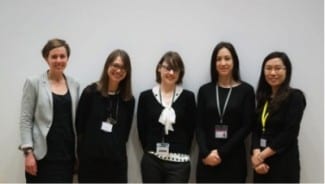From tadpole guts to Nobel Prize: John Gurdon’s UCL Prize Lecture in Clinical Science
By ucyow3c, on 19 November 2015
Written by James Arrich and Isobel Weinberg, both UCL PhD students
Do all the cells of the body possess the same set of genes? This was the question facing a young John Gurdon as he embarked upon his PhD 60 years ago. His research has transformed the way we understand biology in a way that holds promise for the treatment of many common diseases. He received the Nobel Prize in 2012 and on 10 November he visited UCL to give the UCL Prize Lecture in Clinical Science and receive the accompanying medal.
John Gurdon made an unpromising start to his scientific career: at school, he was ranked last out of 250 students for Biology, and was required to give up science and study Classics. Nevertheless, he later chose to switch his degree from Classics to Zoology and then embark on a PhD in cell development.

Nobel Prize winner Professor Sir John Gurdon
Ground-breaking work soon followed. His PhD centred upon the technique of nuclear transplantation.
That is, he would transplant the nucleus of one cell into an egg cell whose own nucleus had been removed (it had been ‘enucleated’) and then watch to see how this egg (with its transplanted nucleus) developed.
In a famous set of experiments, he took a specialised gut cell from a tadpole and transplanted the cell’s nucleus into an enucleated egg. Astonishingly, he demonstrated that such eggs (with their transplanted ‘gut’ nuclei) could develop into healthy frogs. That is, the nucleus of a gut cell that was wholly specialised to absorb nutrients still possessed all the genes required to make an entire new frog.
The implications were huge. Not only did all the cells of an organism possess the same genes, but clearly some factors in the egg cell could revert an adult, specialised cell into a stem cell capable of generating any other cell type. The phenomenon was termed nuclear reprogramming and Gurdon has spent the rest of his career unravelling the mechanisms that underlie it.
 Close
Close



 like the BBC’s Question Time, there was broad consensus among the panel and the audience that Britain’s membership of the EU is vital: for science research; for the growth of knowledge through EU students at UK universities and through world-leading research collaborations and partnerships. But panellist
like the BBC’s Question Time, there was broad consensus among the panel and the audience that Britain’s membership of the EU is vital: for science research; for the growth of knowledge through EU students at UK universities and through world-leading research collaborations and partnerships. But panellist 
